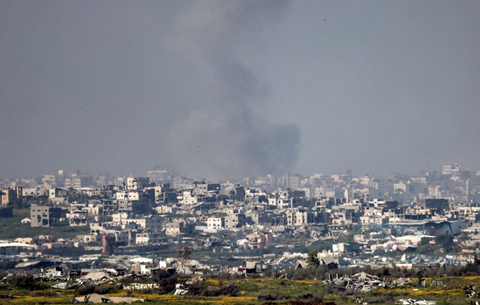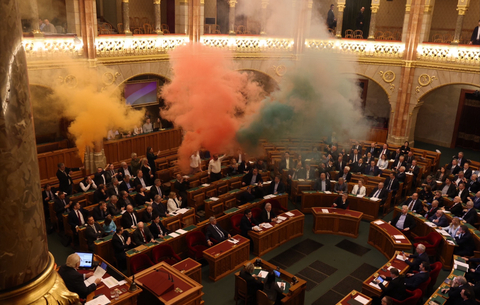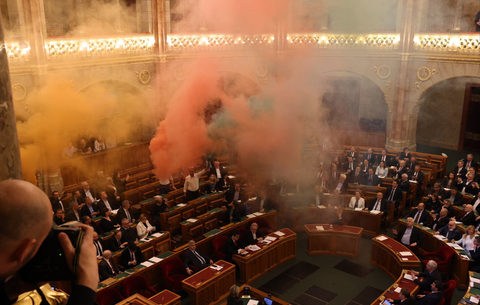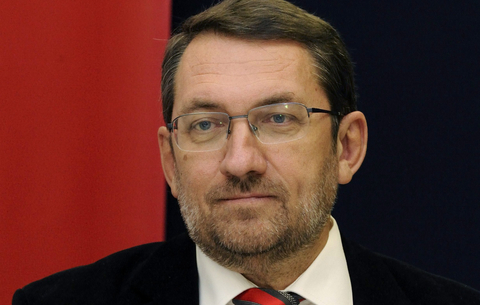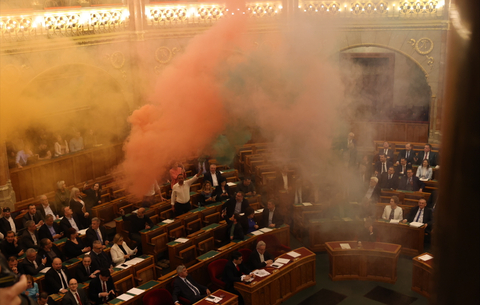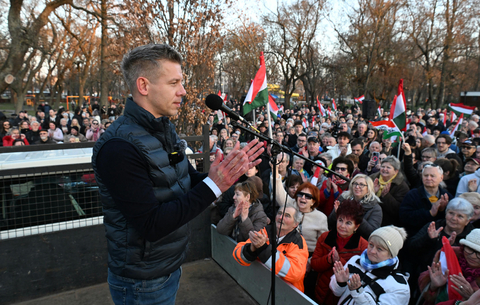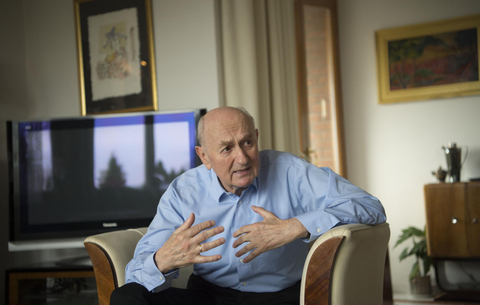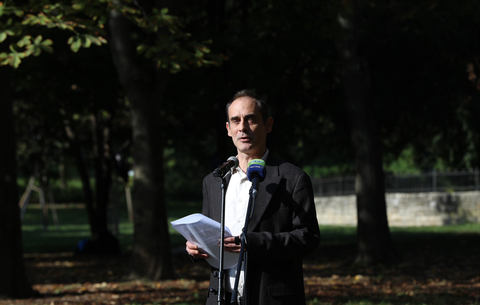Crises and emotions
The wounds dividing Hungarian society have grown deeper over the past 16 years, with no sign of their healing. Does this mean that the regime change has not yet come to an end? Do we need a new revolution?
© Dudás Szabolcs |
The people who participated in those "regrettable events" commemorating the 50th anniversary of the earlier "regrettable events" of 1956 are convinced that there was no genuine regime change in 1989-1990. A new revolution is needed, they argue, or at the very least a lengthy period of Fidesz government. There has been talk of an 'incomplete regime change' since the very beginning, though at first the thought was more characteristic of radical Free Democrats, before becoming the property of the Far Right.
The radicalism of the Free Democrats stemmed from two experiences.
First, the first coalition, led by the Hungarian Democratic Forum, employed the most pathetic post-Kadar rhetoric, trying to obscure the parlous state of the country's economy. The other factor was the way that functionaries of the Kadar regime continued to rule in the government offices and the factories. As chairman of the Free Democrats, Janos Kis said: "We were the regime's opposition, and now we are the government's opposition." He was trying to put an end to his supporters' dangerous impatience. But the radical dissatisfaction chimed well with a sense of disappointment in the country - which was reflected in very low turn-out rates of around 40 per cent in the local elections of that period, from which the governing coalition emerged seriously wounded.
It took just one lie - raising the price of petrol despite earlier promises - for a taxi blockade to bring the country to a standstill in just a couple of hours. Ivan Peto directed the taxi drivers by mobile phone from the Free Democrat headquarters, legend later claimed, although mobile phones had not yet arrived in Hungary in 1990. The taxi drivers communicated with each other via CB radio. It was this technical advantage that allowed them to get organized so quickly.
Events surprised the Free Democrat leadership just as much as everybody else. In the middle of the crisis, senior party officials called for people to refrain from violence and advocated negotiations with the taxi drivers, though they also called for three ministers to be sacked.
But the party's voters and activists, like most of society, saw the civil disobedience movement as a reflection of their own desires and expected it to deliver miracles - the fall of the government, a swift, radical, genuine regime change. Yet the local elections had seen many of the old village council chairmen elected mayors, proving that voters were less obsessed with getting shot of the communist leaders than party activists.
The Free Democrat elite was not expecting a miracle, but they found it almost unbearable that, despite losing to the MDF by only a hair's breadth, the party was able to postpone economic reform, slow privatization and re-establish the institutions of the Horthy regime.
In December 1990, Tamas Bauer wrote that there was a political crisis in Hungary. "The government has lost not its parliamentary majority but the acquiescence of society." He called for a government of national unity that would be composed of expert ministers who would run the country for a year or 18 months until early elections were called. The message was clear: József Antall must go. Gaspar Miklos Tamas gave the government the same amount of time. The MDF had lost public trust, he said, which could only be restored by calling elections for 1991 or 1992. A party congress was held on 30 November 1990, at which many delegates expressed their impatience, calling for immediate change. But it soon became clear that there would be no repetition of the taxi blockade.
The street can make demands in a parliamentary democracy, but it can solve very little. There were problems with the demands themselves, as well. Beyond the demand that petrol prices should not rise, the general sense of dissatisfaction to which the taxi drivers were giving voice could not be shaped into genuine constitutional demands. The government did not fall, and the radicals left the Free Democrats, starting on their rightward journey. Istvan Csurka once said that his Hungarian Truth and Life Party (MIEP)'s reserves consisted of disillusioned Free Democrats. Since then, the MIEP has also been assimilated, but right-wing radicalism is stronger than ever. (But the shriveling of the Free Democrats cannot be explained by the radicals' departure. From 1994 onwards, many left the party who believed the Free Democrats to be the true party of the regime change. But this is another story).
There are striking parallels between the crises of autumn 1990 and autumn 2006. But there are also important differences. The taxi drivers' violence was passive. In 1990, the government gave in to pressure from the Free Democrats and the President, and did not seek confrontation with the police. People liked the police, and the police enjoyed being liked. This shored up a movement which in any case enjoyed broader public support and isolated government supporters who wanted to see a more heavy-handed response. The blockade was not intended to support political goals, and the opposition did not tie it to political rallies. On the contrary: the Free Democrats emphasised throughout that petrol price increases were unavoidable.
By contrast, on 18 September, the day after the prime minister's Oszod speech leaked out, it was not just right-wing columnists but Zoltán Pokorni, Fidesz's vice-chairman, who said Ferenc Gyurcsány had lost his moral authority. Then, two opposition parliamentary group leaders said the government should resign. A smaller group was protesting on Kossuth tér on the evening of 17 September, but the mass rally that gathered on the square the following day supported the opposition's political goals. Then, Viktor Orbán called on his supporters to gather for daily mass rallies before Parliament. The demonstrations became violent, with supporters forcing their way into the closed area in front of the parliament building.
The street protests were highly divisive, as well: scenes of violence drove away many potential backers. It was only the police's vengeful brutality after the Szabadsag tér fiasco that allowed the opposition to regain control of events, drawing attention away from their failure to bring down the government. This is why it was a political error for Gabor Kuncze, Free Democrat chairman, and Gabor Demszky, the mayor of Budapest, to support the national police chief.
The opposition gave the protesters a slogan: Gyurcsany must go! But what brought them to the streets? It wasn't just moral outrage at Gyurcsany's lies, since Fidesz's campaign was also built on lies ("we are worse off than four years ago"). Gyurcsany's brutal frankness may even have evoked a degree of sympathy. The outrage had deeper roots.
One of the most interesting disputes in the history of the Free Democrats concerned the afterlife of the taxi blockade. It took place in 1991 at a meeting of the Free Democrats' parliamentary group. Gyula Teller, a Free Democrat MP, claimed regime change had only occurred at the top, at the level of the political elite. He said: "The groups who ruled in the Kadar regime are still in place in the world of academia, in the armed forces and in our reformed public administration. They are still there in our companies and cooperatives and in public interest groups and in the mass media, in local civil society." Every party had promised a "spring clean" before the elections, but the two main parties, the MDF and the Free Democrats, had come to those same old groups for support. The Free Democrats had to turn to the lower strata of society, which had an interest in seeing change. "We must lead them in a fight against these ossified structures." The silent majority needed to be freed from its passivity and educated out of seeing salvation in "a gigantic father figure."
Janos Kis said Teller's assessment was correct, but that his conclusions were wrong. Hungary's revolution had been blood-free and short. Much of society had had no part in it. Society was dissatisfied with the superficial changes that had taken place, it was impossible to lead it into a full-blown revolution. Instead of instigating a social movement, it was important to work on reforming institutions. Democracy and a market economy would generate their own new elites.
Fifteen years have passed since that debate. Gyula Teller left the Free Democrats in 1994, becoming Viktor Orban's adviser. It is likely he was drawn by Viktor Orban's vision of society. The Civic Circles movement provides a way of politicizing local society. The common denominator is that there was only a partial regime change in Hungary, with communists hanging on to both their informal and formal power.
But what does that mean, if the functionaries of the Kadar regime were re-elected into government in 1994 with a large majority, and if many of these same functionaries continued to play a political role in 2002 and 2006? It seems unlikely that society blames those ossified structures for its miseries if they continue to re-elect them. At most, they must believe that the alternatives are no better.
Demands for a new regime change are just rhetorical: there is little in the way of genuine content. But the demands have resonance on the street. It's not just radical stone-throwers, but Orban fans who see themselves as moderates. The protesters identify with the revolutionaries of 1956. People who were beaten or arrested by police are crowned with the halo of martyrdom. In 2002, Fidesz's defeat was explained by electoral fraud. The party leadership officially accepted the electoral outcome, but was happy to see protesters taking to the streets to protest against fraud. In 2006, the Socialists' victory was so large that it was impossible to blame it on electoral fraud. The Oszod speech was a huge gift to Orban: he could resume the campaign against the hated opponent who had defeated him not just in an election but in two televised debates.
The defeat of Fidesz and the Socialist victory hurt many people. It hurt Fidesz clients, who had hoped they could reap the rewards of a Fidesz victory at the expense of Socialist-Free Democrat clients. It hurt the middle class, which felt they had lost their advantages - even though the Socialists' social and economic policies were somewhat favorable to the middle classes. But the emotional hurt was more painful: the left-wing coalition's victory had brought to power the unpatriotic, who were indifferent to the fate of the nation.
There is a good reason for this. Between 1945 and 1989 the Soviet Union hurt many millions of people. It wasn't just the people who ended up in prison or in concentration camps, people who were declared class enemies, people who lost their property or their jobs. It also hurt those who had to conceal the fact that they had been in public administration before 1945, or who had served as soldiers in Serbia or on the Russian front. These wounds solidified into tradition as generations passed. These people and their descendants are all potential Fidesz voters, and the party can count on their support in mass rallies. At a recent debate, one speaker claimed that many more people were beaten up on 23 October than officially admitted. He continued that most had not dared to make a report because their parents had warned them how Bolsheviks deal with complaints. It is true that anybody who makes an official complaint against the police risks being prosecuted for using violence against an official. The statistics show that the victim is 10 times more likely to be condemned than the policeman. But this has little to do with the Bolshevik terror of the 1950s.
And the people who inflicted these wounds were never brought to justice. It is a commonplace to say that nothing has any consequences in Hungary. But they say something else on the Right. "The Jews got not just compensation, but they could try and condemn to death the people who supposedly hurt them. But Hungarians had no say in the deportation of the Hungarian Jews. The ones who killed Hungarians can think back with satisfaction on their years of service to the party.
Their comrades are still in charge." It is hard to prove anti-semitism formally. Even the extreme right-wingers know that open Jew-baiting does not help the national movement. But wave the right kind of flag, and you know that others know what you're thinking. A red and white striped flag does not commemorate Hungarian Saint Elisabeth, but Ferenc Szalasi. Who resisted the Bolsheviks to the last and shut the Jews up in a ghetto before shooting them into the Danube.
There could be no repetition of the taxi blockade, because disillusionment could not be shaped into meaningful political demands.
But the protests of September and October could repeat themselves at any moment, precisely because they were driven by unshaped emotions.
Still, Fidesz is likely to be cautious, avoiding openly supporting street movements that could explode into rioting. Hungary is neither Georgia nor Ukraine. The government will not go, however long the protesters remain on the streets. Neither the European Union nor the United States are putting pressure on the government to resign. The spring elections were entirely proper - everything else is a Hungarian internal matter. An amnesty followed the taxi blockade, even though the MDF's extremists demanded severe punishments. There is no justification for an amnesty on this occasion, because anybody who throw stones at another person, whether a police officer or a civilian, deserves punishment. It is wrong to offer advice to courts.
But if I were a judge, I would not regard police officers as disinterested witnesses. I would only hand down prison sentences to people who had been recorded on film throwing dangerous projectiles at police officers.
For Gyurcsany, the referendum initiative is far more dangerous than any street violence. Orban is once again playing double or quits. If an unpredictable Constitutional Court decides that the questions are constitutional, it is possible that voters who are beginning to feel the impact of belt-tightening will go out and vote. If they do, then they are likely to vote against tuition and surgery consultation fees.
Since the first referendum in 1989, the Hungarian people has voted wisely, or wisely abstained in every referendum. But a referendum victory for Fidesz would strike the government's programme down, forcing the government to rewrite the budget and might even force early elections. But a referendum failure would put Orban in a difficult position. Fidesz's victory in the local elections has greatly strengthened his position. But the new situation bears new dangers for him. The new Fidesz local leaders owe their position not just to the party leader, who has a track record of frequent reshuffles, but to the support of the local community as well. If Orban suffers another defeat, Lajos Kosa, mayor of Debrecen, will not be the only leader in a position to move concertedly against Orban.
Another threat to the government is that the reforms will fizzle out or prove ineffective. After six months of reform rhetoric, the public knows far more about measures to cut expenditure or increase revenues than it does about the content of the reforms themselves. The consultation fee is easy to understand, but is it a reform?
One thing is certain: we don't need a new revolution (something that even a Fidesz government could not deliver), but that the government should be able to bring about cost-cutting reforms despite the continuous attacks of the opposition and the pressure groups. We need an effective social policy, an efficient healthcare system. We need to bring an end to school segregation, which, if left unchecked, will bring about positively dangerous tensions in the country within 10 or 15 years. If the long-awaited reforms don't begin, then in three years' time voters will have no reason to give their vote to Ferenc Gyurcsany, and may well vote for Viktor Orban once again.
This years' Christmas lights are brighter and prettier than I've ever seen them. If you walk along the Vaci utca or the Andrassy ut, it is astonishing to think that two months ago rioters were charging police lines throwing paving slabs as the police responded with tear gas, water cannon and mounted charges. But the bright lights cannot conceal citizens' concerns. They are worrying about their jobs, about how to pay the heating bills and whether they can afford medicine. But it's not just themselves and their families they are worrying about. They don't know how long the heightened tensions in the country will last.
How long can people go on hating us, how long can we go on hating them?
FERENC KŐSZEG
